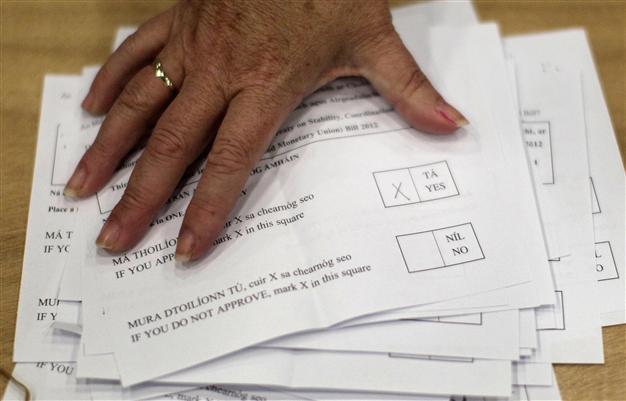Irish voters back EU fiscal pact: near-complete results
DUBLIN - Agence France-Presse

An electoral worker counts votes in the European Fiscal Treaty Referendum at the City West Hotel, Dublin, Ireland, Friday, June 1, 2012. AP Photo
Ireland appears to have voted comfortably in favour of the
EU fiscal pact aimed at shoring up the
eurozone, near-complete results from its referendum showed on Friday.
Official results from 40 of the 43 constituencies showed a score of around 60 percent for the "yes" vote and 40 percent for the "no".
The EU will be spared a headache if Ireland ratifies the treaty -- which would enforce stricter budgetary discipline in countries that sign up -- as a "no" vote could have fuelled a growing backlash against austerity in Europe.
A "yes" vote would also come as a huge relief to the debt-laden Irish government as only countries that ratify the pact will have guaranteed access to the EU's new permanent bailout fund.
The counting of votes from Thursday's referendum began at 9:00 am (0800 GMT) and a final result was due between 4:00 pm and 6:00 pm.
Deputy Prime Minister Eamon Gilmore said the government-backed "yes" campaign was heading for victory.
"What is emerging here is a very clear and decisive decision by the people," Gilmore told RTE radio.
"There is no ambiguity about it. There is no doubt about it." He added: "This decision which has been taken by the Irish people is a necessary step on our road to recovery but we have now to build on it. Especially, we have to take on board what we heard during this campaign." Ireland was forced to accept an 85-billion-euro ($106 billion) bailout by the EU and IMF in 2010, and the "no" camp sought to harness public anger against the spending cuts and tax rises brought in as part of the deal.
Opponents labelled the fiscal pact an "austerity treaty" as it empowers the EU to fine countries that overspend.
Although pre-referendum opinion polls predicted a clear victory for the "yes" campaign, only half the 3.1 million-strong electorate turned out to vote, raising fears that the low turnout could help the "no" camp.
But most voters appear to have accepted the government's warning that if Ireland does not ratify the pact, it would not be able to access the European Stability Mechanism (ESM), the permanent rescue fund that comes into force in July.
Ministers have warned that they may need to access the ESM when its current bailout package -- brought in after Ireland's property bubble burst and the economy nearly collapsed -- expires in 2013.
Sonia Pangusion, analyst for Ireland at IHS Global Insight consultancy firm, said a "yes" vote would be "good news for the future of the country".
"It sends a positive message to the markets -- a message that Ireland is determined to be part of the euro, assuming all the painful consequences of such decision." But she added: "Ireland's citizens have become progressively unhappier with the way the austerity measures are undermining their incomes, and apathy about the euro project has clearly risen, judging by the low turnout." Ireland is the only country holding a national referendum on the fiscal pact, which all 27 EU members have signed except Britain and the Czech Republic.
Although a "no" vote would have fuelled the growing campaign for Europe to focus on growth rather than belt-tightening, it would not have plunged the EU into crisis, as Ireland did in voting against two previous EU treaties.
The fiscal pact could still have gone ahead without Ireland, as it needs to be ratified by just 12 countries to come into force.
Denmark on Thursday became the fifth country to ratify the pact after Romania, Portugal, Greece and Slovenia.
European Union,
